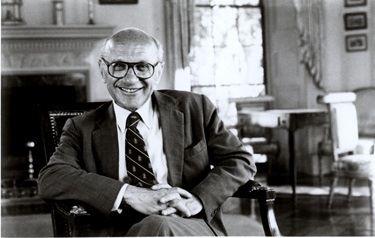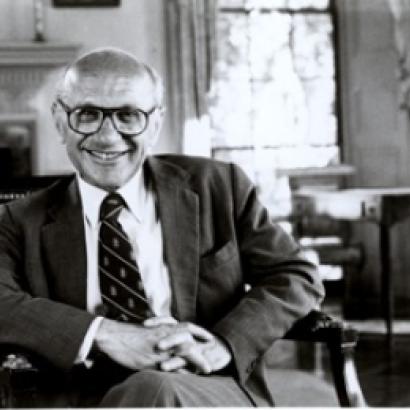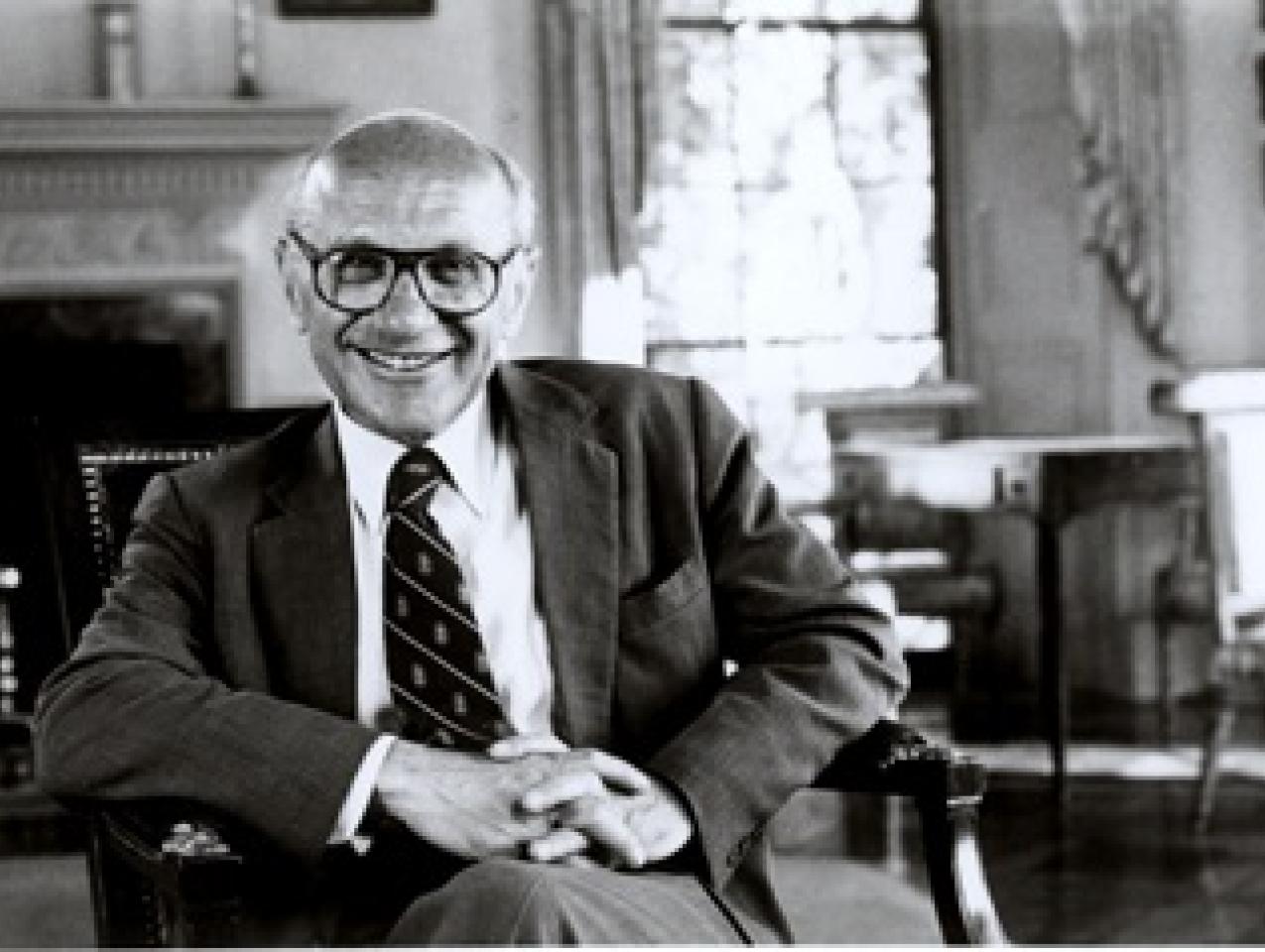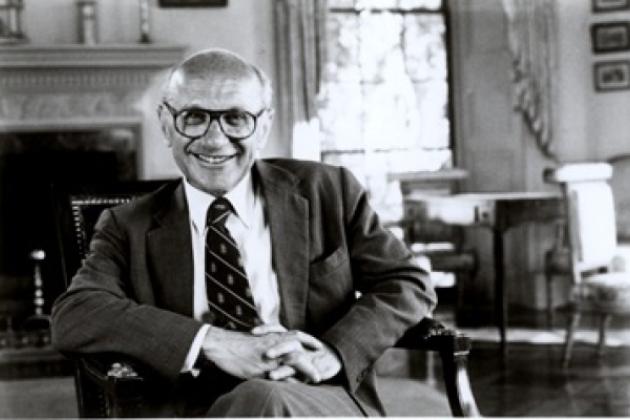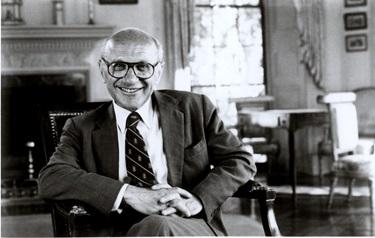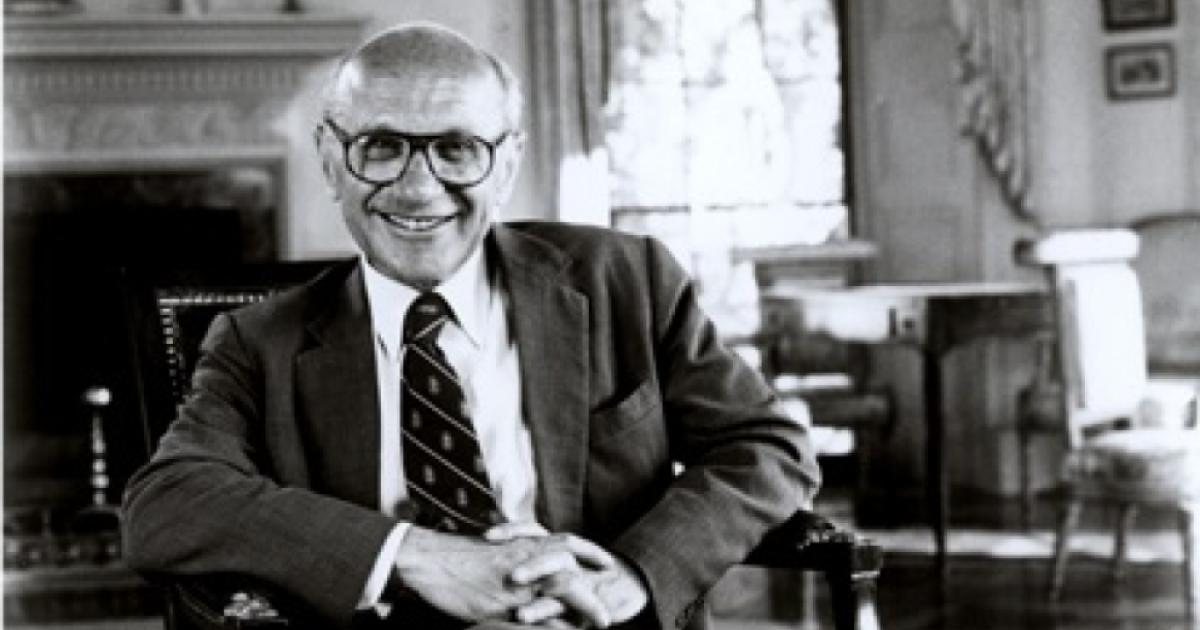- Economics
Editor’s note: The founding four hundred members of the Pepperdine University Associates assembled for the first time on February 9, 1977, to celebrate the fortieth anniversary of the university and to hear the charter address, “The Future of Capitalism,” by Milton Friedman. The text of this speech appears in the new Hoover Press book Milton Friedman on Freedom, edited by Robert Leeson and Charles G. Palm.
When I speak of the future of capitalism, I mean the future of competitive capitalism—a free enterprise capitalism. In a certain sense, every major society is capitalist. Russia has a great deal of capital, but the capital is under the control of governmental officials who are supposedly acting as the agents of the state. That turns capitalism (state capitalism) into a wholly different system than a system under which capital is controlled by individuals in their private capacity as owners and operators of industry. What I want to speak about tonight is the future of private enterprise—of competitive capitalism.
The future of private enterprise capitalism is also the future of a free society. There is no possibility of having a politically free society unless the major part of its economic resources are operated under a capitalistic private enterprise system.
The Trend toward Collectivism
The real question therefore is the future of human freedom. The question that I want to talk about is whether or not we are going to complete the movement that has been going on for the past forty or fifty years, away from a free society and toward a collectivist society. Are we going to continue down that path until we have followed Chile by losing our political freedom and coming under the thumb of an all-powerful government? Or are we going to be able to halt that trend, perhaps even reverse it, and establish a greater degree of freedom?
One thing is clear, we cannot continue along the lines that we have been moving. In 1928, less than fifty years ago, government at all levels—federal, state, and local—spent less than 10 percent of the national income. Two-thirds of that was at the state and local level. Federal spending amounted to less than 3 percent of the national income. Today total government spending at all levels amounts to 40 percent of the national income, and two-thirds of that is at the federal level. So federal government spending has moved in less than fifty years from 3 percent to over 25 percent—total government spending from 10 percent to 40 percent. Now I guarantee you one thing. In the next fifty years government spending cannot move from 40 percent of the national income to 60 percent. (Legislatures have tried to legislate that the value of p shall be exactly three and a seventh, but they cannot repeal the laws of arithmetic!)
We cannot continue on this path. The question is, will we keep trying to continue on this path until we have lost our freedom and turned our lives over to an all-powerful government in Washington, or will we stop?
In judging this possibility, it’s worth talking a little bit about where we are and how we got here—about the present and the past. Let me say at the outset that with all the problems I am going to talk about, this still remains a predominantly free society. There is no great country in the world (there are some small enclaves but no great country) that offers as much freedom to the individual as the United States does. But having said that we ought also to recognize how far we have gone away from the ideal of freedom and the extent to which our lives are restricted by governmental enactments.
In talking about freedom it is important at the outset to distinguish two different meanings on the economic level, of the concept of free enterprise, for there is no term that is more misused or misunderstood. The one meaning that is often attached to free enterprise is the meaning that enterprises shall be free to do what they want.
That is not the meaning that has historically been attached to free enterprise. What we really mean by free enterprise is the freedom of individuals to set up enterprises. It is the freedom of an individual to engage in an activity so long as he uses only voluntary methods of getting other individuals to cooperate with him. If you want to see how far we have moved from the basic concept of free enterprise, you can consider how free anyone is to set up an enterprise. You are not free to establish a bank or to go into the taxicab business unless you can get a certificate of convenience and necessity from the local, state, or federal authorities. You cannot become a lawyer or a physician or a plumber or a mortician (and you can name many other cases) unless you can get a license from the government to engage in that activity. You cannot go into the business of delivering the mail or providing electricity or of providing telephone service unless you get a permit from the government to do so. You cannot raise funds on the capital market and get other people to lend you money unless you go through the Securities and Exchange Commission and fill out the four hundred pages of forms that they require. To take the latest restriction on freedom, you cannot any longer engage in voluntary deals with others or make bets with other people about the future prices of commodities unless you get the approval of the government.
Rising Taxation
Another example of the extent to which we have moved away from a free society is the 40 percent of our earnings, on the average, that is co-opted by the government. Each and every one of us works from the first of January to late in April or May in order to pay governmental expenses before we can start to work for our own expenses.
If you want to look at it still another way, the government owns 48 percent of every corporation in the United States. We talk about ourselves as a free enterprise society. Yet in terms of the fundamental question of who owns the means of production, in the corporate sector we are 48 percent socialistic because the corporate tax is 48 percent. What does it mean if I own 1 percent of a corporation? It means I am entitled to 1 percent of the profits and 1 percent of the losses. Well, the federal government shares 48 percent of your profits and 48 percent of your losses (if you have some previous profits to offset against those losses).
Once when I was in Yugoslavia some years ago I calculated that the difference in the degree of socialism in the United States and in communist Yugoslavia was exactly eighteen percentage points, because the US government took 48 percent of the profits of every corporation and the Yugoslav government took 66 percent of the profits of every corporation. And, of course, those numbers grossly understate the role of the government because of its effect in regulating business in areas other than taxation.
Let me give you another example of the extent to which we have lost freedom. About a year or so ago, I had a debate in Washington with that great saint of the United States consumer, Ralph Nader. I planted a question on him because I knew what the answer would be and I wanted to extract the answer. The question I took up was the question of state laws requiring people who ride motorcycles to wear motorcycle helmets. Now I believe in many ways that law is the best litmus paper I know to distinguish true believers in individualism from people who do not believe in individualism because this is the case in which the man riding the motorcycle is risking only his own life. He may be a fool to drive that motorcycle without a helmet. But part of freedom and liberty is the freedom to be a fool! So I expressed the view that the state laws that make it compulsory for people who are riding motorcycles to wear helmets were against individual freedom and against the principles of a free society. I asked Ralph Nader for his opinion, and he gave the answer I expected. He said, “Well, that’s all very well for a different society. But you must realize that today, if a motorcyclist driving down the road without a helmet splashes himself on the pavement, a government-subsidized ambulance will come to pick him up, they will take him to a -government-subsidized hospital, he will be buried in a government-subsidized cemetery, and his wife and children will be supported by government-subsidized welfare. Therefore we can’t let him!” What he was saying was that every single one of us bears on our back a stamp that says “Property of the US Government. Do not fold, bend, or mutilate.”
That is essentially the fundamental principle that animates the Ralph Naders of our time—the people who want the power to be in government. You see it everywhere. You see it in a law passed a few years ago that requires the Treasury Department to report to the Congress a category called “Tax expenditures.” Tax expenditures are taxes that are not collected from you because of various deductions permitted by the law (such as interest or excess depreciation). The principle is that you are, after all, the property of the US government. You work for the US government, and the US government lets you keep a little of what you earn in order to be sure that it’ll keep you working hard for it. But the rest of it is the property of the US government. And if the US government allows you to deduct something from your taxes, it’s providing for the expenditure. It’s not a right that you have to keep it. It belongs to the government!
Other Freedoms Denied
We have gone very far indeed along the road to losing freedom. But you may say that I am talking only about economic matters, about whether you can enter a profession or an occupation. What about political freedom? What about the freedom of speech? How many businessmen have you heard in the past ten years who have been willing to stand up on some public rostrum and take issue with governmental policies? I have heard many a businessman get up and express general sentiments in favor of free enterprise and of competition. I have heard very few get up and criticize particular measures taken by government. And I don’t blame them. They would be fools to do it! Because any businessman who has the nerve to do that has to look over one shoulder and see what the Internal Revenue Service is going to do to his books the next day. And he has to look over the other shoulder to see whether the Justice Department is going to launch an antitrust suit. And then he has to find two or three more shoulders to see what the Federal Trade Commission is going to do. You can take any other three letters of the alphabet and ask what they are going to do to you. In fact, a businessman today does not have effective freedom of speech.
But businessmen don’t matter since they’re only material business people. What about those people for whom we are really concerned: the intellectuals?
I asked my colleagues, suppose I take a professor from a medical school whose research and training is largely being financed by the National Institutes of Health. Do you suppose he wouldn’t think three times before he gives a speech against socialized medicine? Suppose I take one of my colleagues in economics who has been supported by a grant from the National Science Foundation. I personally happen to think there is no justification for the National Science Foundation. (As it happens, I have never received a grant from them though I might have. It isn’t that they have turned me down; I haven’t asked them!) But nonetheless, do you suppose my colleagues would not be inhibited in speaking out? In fact, I have often said about the only people who have any real freedom of speech left are people who are in the fortunate position of myself: tenured professors at major private universities on the verge of retirement!
Freedom of the Press
Let me give you an even more chilling story about freedom of the press. The other day I got a clipping from an English paper from a friend of mine, indicating that the London Times had been prevented from publishing on one day because the unions, who have controlled the press, refused to publish because the issue carried a story that was critical of the policies of unions. Do you mean to say that there aren’t American newspapers that would hesitate very much before printing stories and articles that would be regarded as antagonistic by the trade unions on which they depend to produce their papers?
So there is no way of separating economic freedom from political freedom. If you don’t have economic freedom, you don’t have political freedom. The only way you can have the one is to have the other.
The Nineteenth Century
So much for the present, what about the past? The closest approach to free enterprise we have ever had in the United States was in the nineteenth century. Yet your children will hear over and over again in their schools and in their classes the myth that that was a terrible period when the robber barons were grinding the poor miserable people under their heels. That’s a myth constructed out of whole cloth. The plain fact is that never in human history has there been a period when the ordinary man improved his condition and benefited his life as much as he did during that period of the nineteenth century when we had the closest approach to free enterprise that we have ever had. Most of us in this room, I venture to say, are beneficiaries of that period. I speak of myself. My parents came to this country in the 1890s. Like millions of others they came with empty hands. They were able to find a place in this country, to build a life for themselves and to provide a basis on which their children and their children’s children could have a better life. There is no saga in history remotely comparable to that of the United States during that era, welcoming millions and millions of people from all over the world and enabling them to find a place for themselves and to improve their lives. And it was possible only because there was an essentially free society.
If the laws and regulations that today hamstring industry and commerce had been in effect in the nineteenth century, our standard of living today would be below that of the nineteenth century. It would have been impossible to have absorbed the millions of people who came to this country.
Why Regimentation?
What produced the shift? Why did we move from a situation in which we had an essentially free society to a situation of increasing regimentation by government? In my opinion the fundamental cause of most government intervention is an unholy coalition between well-meaning people seeking to do good on the one hand and special interests (meaning you and me) on the other taking advantage of those activities for our own purposes.
The great movement toward government has not come about as a result of people with evil intentions trying to do evil. The great growth of government has come about because of good people trying to do good. But the method by which they have tried to do good has been basically flawed. They have tried to do good with other people’s money. Doing good with other people’s money has two basic flaws. In the first place, you never spend anybody else’s money as carefully as you spend your own. So a large fraction of that money is inevitably wasted. In the second place, and equally important, you cannot do good with other people’s money unless you first get the money away from them. So that force—sending a policeman to take the money from somebody’s pocket—is fundamentally at the basis of the philosophy of the welfare state. That is why the attempt by good people to do good has led to disastrous results. It was this movement toward welfare statism that produced the phenomenon in Chile that ended the Allende regime. It is this tendency to try to do good with other people’s money that has brought Great Britain—once the greatest nation of the earth, the nation that is the source of our traditions and our values and our beliefs in a free society—to the edge of catastrophe. It will be touch and go whether over the next five years Great Britain will be able to maintain a free society or relapse into collectivism.
When you start on the road to do good with other people’s money, it is easy at first. You’ve got a lot of people to pay taxes and a small number of people for whom you are trying to do good. But the later stages become harder and harder. As the number of people on the receiving end grows, you end up in the position where you are taxing 50 percent of the people to help 50 percent of the people or, really, 100 percent of the people to distribute benefits to 100 percent! The reductio ad absurdum of this policy is a proposal to send out a rain of $50 checks to all and sundry in the next few months.
The Future
Where do we go from here? People may say, “You can’t turn the clock back. How can you go back?” But the thing that always amuses me about that argument is that the people who make it and who accuse me or my colleagues of trying to turn the clock back to the nineteenth century are themselves busily at work trying to turn the clock back to the seventeenth century.
Adam Smith, two hundred years ago, in 1776, wrote The Wealth of Nations. It was an attack on the government controls of his time—on mercantilism, on tariffs, on restrictions, on governmental monopoly. But those are exactly the results that the present-day reformers are seeking to achieve.
In any event, that’s a foolish question. The real question is not whether you are turning the clock back or forward but whether you are doing the right thing? Do you mean to say you should never learn from your mistakes?
Some people argue that technological changes require big government and that you can no longer talk in the terms of the nineteenth century when the government only absorbed 3 percent of the national income. You have to have big government because of these technological changes. That’s nonsense from beginning to end. Some technological changes no doubt require the government to engage in activities different from those in which it engaged before. But other technological changes reduce the need for government. The improvements in communication and transportation have greatly reduced the possibility of local monopoly, which requires government intervention to protect the consumers. Moreover, if you look at the record the great growth of government has not been in the areas dictated by technological change. The great growth of government has been to take money from some people and to give it to others. The only way technology has entered into that is by providing the computers that make it possible to do so.
Other people will say, how can you talk about stopping this trend? What about big business? Does it really make any difference whether automobiles are made by General Motors, which is an enormous bureaucratic enterprise employing thousands of people, or whether they are made by an agency of the United States government, which is another bureaucratic enterprise?
The answer to that is very simple. It makes all the difference in the world because there is a fundamental difference between the two. There is no way in which General Motors can get a dollar from you unless you agree to give it to the company. That’s a voluntary exchange. It can only get money from you by providing you with something you value more than the money you give it. If it tries to force something on you that you don’t want, ask Mr. Henry Ford what happened when Ford tried to introduce the Edsel. On the other hand the government can get money from you without your consent. They can send policemen to take it out of your pocket. General Motors doesn’t have that power. And that is all the difference in the world. It is the difference between a society in which exchange is voluntary and a society in which exchange is not voluntary. It’s the reason why the government, when it is in the saddle, produces poor quality at high cost, while industry, when it’s in the saddle, produces quality at low cost. The one has to satisfy its customers and the other does not.
Two Possible Scenarios
Where shall we go from here? There are two possible scenarios. The one (and I very much fear it’s the more likely) is that we will continue in the direction in which we have been going, with gradual increases in the scope of government and government control. If we do continue in that direction, two results are inevitable. One result is financial crisis and the other is a loss of freedom.
The example of England is a frightening example to contemplate. England has been moving in this direction. We’re about twenty years behind England in this motion. But England was moving in this direction earlier than we were moving and has moved much farther. The effects are patent and clear. But at least when England moved in this direction and thus lost its power politically and internationally, the United States was there to take over the defense of the free world. But I ask you, when the United States follows that direction, who is going to take over from us? That’s one scenario, and I very much fear it’s the more likely one.
The other scenario is that we will, in fact, halt this trend, that we will call a halt to the apparently increasing growth of government, set a limit, and hold it back.
There are many favorable signs from this point of view. I may say that the greatest reason for hope, in my opinion, is the inefficiency of government. Many people complain about government waste. I welcome it. I welcome it for two reasons. In the first place, efficiency is not a desirable thing if somebody is doing a bad thing. A great teacher of mine, a mathematical economist, once wrote an article on the teaching of statistics. He said, “Pedagogical ability is a vice rather than a virtue if it is devoted to teaching error.” That’s a fundamental principle. Government is doing things that we don’t want it to do, so the more money it wastes
the better.
In the second place, waste brings home to the public at large the fact that government is not an efficient and effective instrument for achieving its objectives. One of the great causes for hope is a growing disillusionment around the country with the idea that government is the all-wise, all-powerful big brother who can solve every problem that comes along, that if only you throw enough money at a problem it will be resolved.
Several years ago John Kenneth Galbraith wrote an article in which he said that New York City had no problem that could not be solved by an increase in government spending in New York. Well, since that time the budget in the City of New York has more than doubled and so have the problems of New York. The one is cause and the other effect. The government has spent more but that meant that the people have less to spend. Since the government spends money less efficiently than individuals spend their own money, as government spending has gone up the problems have gotten worse. My main point is that this inefficiency, this waste, brings home to the public at large the undesirability of governmental intervention. I believe that a major source of hope is in the widespread rise in the tide of feeling that government is not the appropriate way to solve our problems.
There are also many unfavorable signs. It’s far easier to enact laws than to repeal them. Every special interest, including you and me, has great resistance to giving up its special privileges. I remember when Gerald Ford became president and he called a summit conference to do something about the problems of inflation. I sat at that summit conference and heard representatives of one group after another go to the podium—a representative of business, a representative of the farmers, a representative of labor, you name the group—they all went to the podium and they all said the same thing. They said, “Of course, we recognize that in order to stop inflation, we must cut down government spending. And I tell you the way to cut down government spending is to spend more on me.” That was the universal refrain.
Many people say that one of the causes for hope is the rising recognition by the business community that business enterprise is a threat to the free enterprise system. I wish I could believe that, but I do not. You must recognize the facts. Business corporations in general are not a defense of free enterprise. On the contrary, they are one of the chief sources of danger.
The two greatest enemies of free enterprise in the United States, in my opinion, have been, on the one hand, my fellow intellectuals and, on the other hand, the business corporations of this country. They are enemies for opposite reasons. Every one of my fellow intellectuals believes in freedom for himself. He wants free speech. He wants free research. I ask him, “Isn’t this a terrible waste that a dozen people are studying the same problem? Oughtn’t we to have a central planning committee to decide what research projects various individuals are to undertake?” He’ll look at me as if I’m crazy, and he’ll say, “What do you mean? Don’t you understand about the value of academic freedom and freedom of research and duplication?” But when it comes to business he says, “Oh, that’s wasteful competition. That’s duplication over there! We must have a central planning board to make those things intelligent, sensible!”
So every intellectual is in favor of freedom for himself and against freedom for anybody else. The businessman and the business enterprise are very different. Every businessman and every business enterprise is in favor of freedom for everybody else, but when it comes to himself, that’s a different question. We have to have that tariff to protect us against competition from abroad. We have to have that special provision in the tax code. We have to have that subsidy. Businessmen are in favor of freedom for everybody else but not for themselves.
There are many notable exceptions. There are many business leaders who have been extremely farsighted in their understanding of the problem and will come to the defense of a free enterprise system. But for the business community in general, the tendency is to take out advertisements, such as the US Steel Company taking out full-page ads to advertise the virtues of free enterprise but then to plead before Congress for an import quota on steel from Japan. The only result of that is for everybody who is fair-minded to say, “What a bunch of hypocrites!” And they’re right.
Now don’t misunderstand me, I don’t blame business enterprise. I don’t blame US Steel for seeking to get those special privileges. The managers of US Steel have an obligation to their stockholders, and they would be false to that obligation if they did not try to take advantage of the opportunities to get assistance. I don’t blame them. I blame the rest of us for letting them get away with it. We must recognize what the real problem is and recognize that that is not a source of strength.
Faith in the Future
Where are we going to end up? I do not know. I think that depends upon a great many things.
I am reminded of a story that will illustrate what we may need. It has to do with a young and attractive nun who was driving a car down a superhighway and ran out of gas. She remembered that a mile back there had been a gas station. She got out of her car, hiked up her habit, and walked back to the gas station. When she got to the station, she found that there was only one young man in attendance there. He said he’d love to help her but couldn’t leave the gas station because he was the only one there. He said he would try to find a container in which he could give her some gas. He hunted around the gas station and couldn’t find a decent container. The only thing he could find was a little baby’s potty that had been left there. So he filled the baby potty with gasoline and gave it to the nun. She took the baby potty and walked the mile down the road to her car. She got to her car and opened the gas tank and started to pour it in. Just at that moment a great big Cadillac came barreling down the road at eighty miles an hour. The driver was looking out and couldn’t believe what he was seeing. So he jammed on his brakes, stopped, backed up, opened the window, and looked out and said, “Sister, I only wish I had such faith!”
Finally, may I say a word of congratulations to Pepperdine University, especially the associates, for your ability not only to survive but to flourish in an educational world increasingly dominated by government institutions. Unless this trend can be contained, or even better reversed, by the continued existence and growth of private institutions like Pepperdine University and my own University of Chicago, our free society will be in mortal danger. Thank you.







